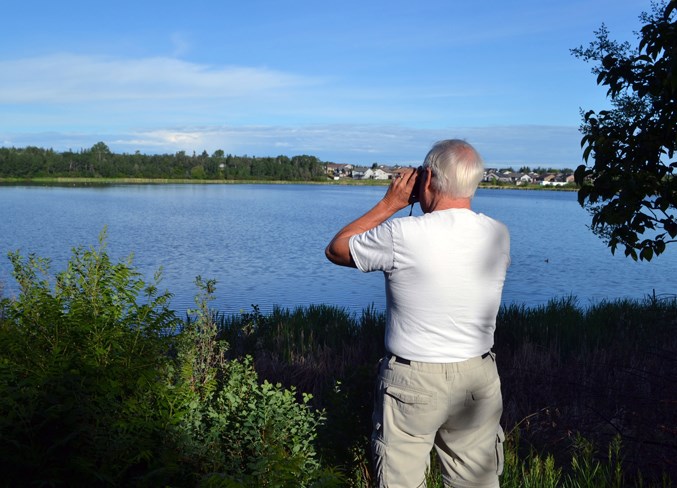INNISFAIL - Town council has given its support to an Innisfail Lions Club initiative to study the feasibility of Dodd's Lake becoming a local fishing hole.
Council was told at its regular June 11 meeting there have been three past decades-old attempts to stock fish in the lake, but each one failed because of its shallow depth (nine to 11 feet at its deepest), low oxygen concentration and unacceptably high temperatures.
"Extended use of the lake is a good thing, but repeating history and doing something that isn't going to work seems to me a waste of time," said Coun. Glen Carritt during the meeting, relying on past expert wildlife reports, with one showing the lake can reach an unacceptable temperature of 86 F.
However, Bob McKinnie, president of the Lions Club, countered it was time to have the lake retested, and if the results show the lake can handle fish it would be a welcome amenity for the community, especially for children.
"Wouldn't it be nice if kids could hop on their bikes, fishing rod in hand, spend a couple of hours there and bring home a fish. Just the whole fishing hole thing you see in the old kids' movies," said McKinnie, adding the club has access to a fish and wildlife biologist -- a former member of the Innisfail Fish and Game Association -- to have the lake tested again.
After considerable discussion council gave the service club the green light by a vote of 6 - 1 to go ahead with its study. The Lions Club is taking full responsbility for time and any expense for the study.
"If the Lions Club want to do the study that is up to them, that is their prerogative," said Carritt, the only council member to vote against the service club's initiative. "I have no issues with different user groups coexisting on the lake as we do with the kayak and water polo club groups, as well as paddleboaters. It's just that history has shown that fish won't survive."
Carritt said he will still oppose fishing in the lake even if the Lions Club comes back to council with a favourable report, not expected for at least a year, that fish can survive in the lake if favourable conditions are created and maintained.
McKinnie told council if future tests of the lake's temperature, oxygen concentration and toxins show that fish stocking is not feasible the plan will be dropped.
"If any of those can't be remediated or eliminated as an issue then the whole project is a no-go because why put fish in if nobody can eat them?" said McKinnie.
Mayor Jim Romane said he likes the idea of fishing in Dodd's Lake as he is a strong proponent of seeing the uses maximized for the benefit of the entire community. However, he also believes it's important to have public consultation on the overall plan and uses for the lake's future.
"As for stocking it with fish, I am not an expert enough to say it can be done. Is there a way that is realistic to do it or is it not realistic, that fish have no chance of survival in there?" Romane wondered.
McKinnie and Bob Leney, president of the local fish and game association, both told council it was possible to create favourable conditions in Dodd's Lake, particularly with the right aeration system that increases oxygen concentration and moderates water temperature. Both said aeration systems have been successfully placed in smaller bodies of water, notably at Bennett Pond, 16 kilometres east of Innisfail, in 2015.
"Now there are good-sized fish being caught there," said McKinnie, adding there is no issue with feed for fish at Dodd's Lake as there is an abundance of leeches. He also said he believed the past three attempts to stock fish at Dodd's Lake failed because no aeration system was used.
In the meantime, McKinnie said exploratory testing work will start this summer, go into the fall and winter and into early spring, to study oxygen levels and lake depths at various locations. McKinnie said the fish and wildlife biologist might be able to indicate if the project is possible, and a report of his findings will then be made available for council's consideration.



